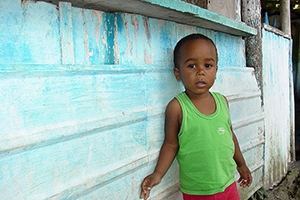Research
New Research to Advance Early Child Health and Development Around the World

It’s widely known that children need to be supported and nurtured in order to grow into healthy and productive adults. But according to a new study, 43 percent of children younger than age five in low and middle income countries are at risk of not reaching their developmental potential due to extreme poverty.
SPA professor Jeremy Shiffman, and Yusra Ribhi Shawar SPA/PhD ’16, a post-doctoral fellow at the University of Pennsylvania, were among several scholars who studied the scope and impact of this problem in a new series of papers, “Advancing Early Childhood Development from Science to Scale,” published Oct. 4 in The Lancet.
Shiffman and Shawar were two of 14 authors on a paper in the Early Childhood Development Series, which found that programs to improve health, nutrition, safety, caregiving, and early learning for children vary in quality, are often uncoordinated, and access is inequitable, especially for those under age three. Without adequate support in the critical early years, adversities can disrupt brain development and cognition.
“You can look at it from so many different perspectives, see why it is important and why we need to pay attention to it,” said Shawar. “Early childhood development affects lifetime health, poverty, the ability of countries to have robust workforce, and is a basic human right.”
Shiffman and Shawar co-authored another paper accompanying the series, “Generation of Global Political Priority for Early Childhood Development: The Challenges of Framing and Governance,” which examines the challenges of defining and prioritizing services in early childhood development. It was based on a chapter in Shawar’s dissertation, for which Shiffman served as chair.
“The core message is that there is global neglect of the development and health of young children,” said Shiffman. “Babies, children over five, and adolescents all get attention, but this is a group of kids who do not get as much attention and resources. That neglect needs to be transcended.”
The study identified the lack of clarity around the problem and suggested that the community deliberate internally to better frame the problem and develop solutions in order to garner support. Without basic agreement on how to frame the issue, it’s nearly impossible to create an agenda and mobilize efforts to move forward.
“The problem is that early childhood development is a nebulous concept. People have a hard time wrapping their heads around it: What does that entail? What does that mean? How do you improve it? What are you asking us to do?” said Shawar. “Doing this series is a great step forward in bringing the community concerned about this together. This in itself is a small win.”
“My hope is that it serves as a conversation starter and that it is an accurate reflection of the dynamics that are happening,” says Shawar of the series. “What’s more important than our children?”
A forum to discuss The Lancet series was held on Oct. 5 at the Ronald Reagan Building in Washington, D.C., sponsored by the World Health Organization, UNICEF, and the World Bank Group.